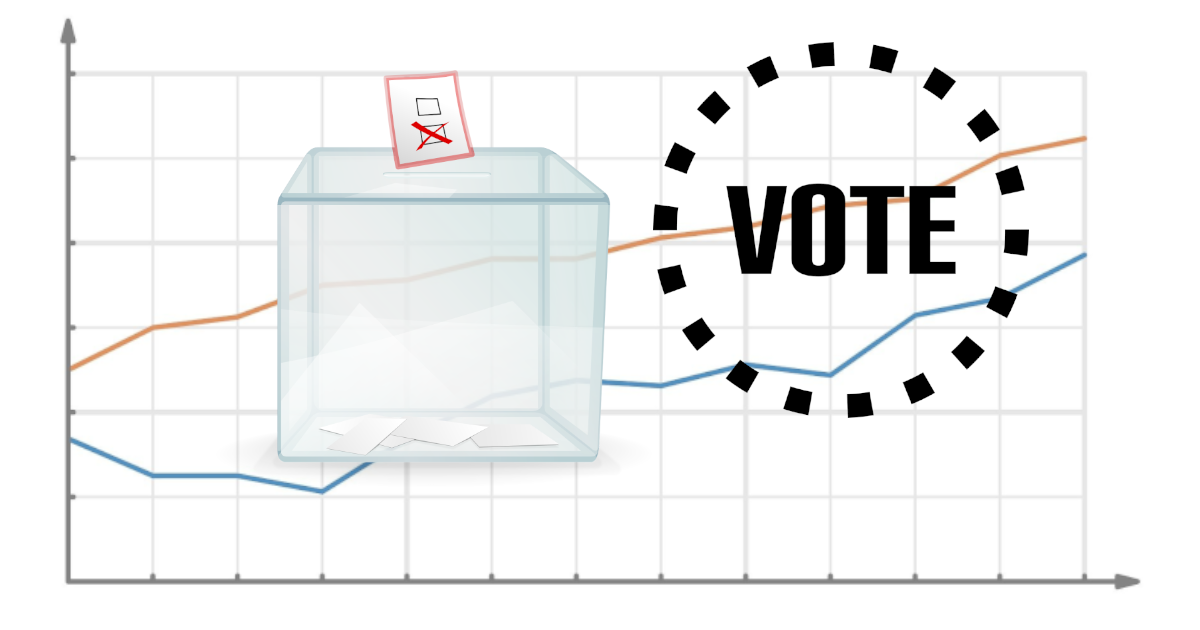

Elections & Markets:
Pause or Proceed Investing?
Election Angst…
As presidential elections approach, it is common for investors to worry about potential market volatility resulting from the outcome. Voters might have concerns that if the candidate they don’t support wins, immediate economic hardships will occur, sending markets plunging. This election related anxiety may cause investors to consider halting any recurring contributions or even exiting the market entirely.
President Limits
“Presidents get too much credit when the economy is doing well, and too much blame when it is going bad.” This phrase is often given in some iteration by economists. Although the US president occupies a position of outsized attention, they as an individual may have a limited influence on US fiscal policy. And while the president and Congress control the fiscal policy of taxing and spending, they do not control monetary policy, which is exclusively delegated to the Federal Reserve system. Particularly in the current climate, the historic actions of the Federal Reserve to begin lowering interest rates after years of keeping them elevated in restrictive territory may be the key focus and driver of markets over the next several quarters. Markets may be fixated on assessing how fast the Fed will ratchet rates back down after leaving them at levels meant to tamp down economic activity in order to tame runaway inflation that ignited from supply chain disruptions in the wake of the pandemic.
History Lessons
A review of market moves in the aftermath of US presidential elections may not support the idea that investing immediately before or after an election involves any additional risk than investing at any other time. In fact, post election price action may support the notion that a long term investor should stick with their regularly recurring allocation schedule without pause or interruption. In the last 9 election cycles since 1988, the stock market has gained an average of 17% in the year following the election. There has been only one instance during that period that saw a decline in the market in the 12 months after the election. In 1988, 1996, 2012, and 2020, which is nearly half of the last nine elections, markets rose over or near 30% within the 12 months after ballots were tallied.
Keep Allocating…
For the average investor who is allocating a portion of their earnings on a regular basis to an IRA or 401k, the best option is likely to keep going with their plan. Portfolio adjustments for retirement investors should most likely be made because of changes in the investor’s situation, not because of changes in the market. Predicting near to midterm market moves with sustained consistency is extremely difficult, even for the most experienced and knowledgeable practitioners. Therefore, for the long-term retirement investor, market downturns may be best viewed as desirable buying opportunities instead of a signal to slam on the brakes or hit eject on investing. Reviewing market reactions to presidential elections over the past 30 plus years suggests that election seasons may not pose any added risk above and beyond non-election years. Despite multiple periods of turbulent ups and downs, the overall market has risen by 1,950% over the past 9 election cycles for an annualized gain of 9% per year.
October 2, 2024
Markets Demystified is published on the first Wednesday of each quarter, and explores how stock market investing can relate to personal finance.
Thanks for reading!
Aesop Advisor LLC advertisements including newsletters and other publications are for informational purposes only. They do not attempt to predict future stock market moves and are not intended as individual investment advice. Aesop Advisor LLC newsletters and publications are not recommendations to buy, sell or hold any asset and are not intended as actionable investment advice or market timing. Equities references generally refer to the overall stock market, though if individual companies are mentioned, it is not a recommendation to buy, sell, or hold shares of the company. Unless otherwise indicated, terms including "stocks", the "stock market", and "market(s)" refer to Standard & Poor's 500 index. All investments involve risk and the past performance of a security or financial product does not guarantee future results or returns. While diversification may help spread risk, it does not assure a profit or protect against loss. There is always the potential of losing money when you invest in securities or other financial products. Publications and advertisements from Aesop Advisor LLC are not intended as investment, legal, or tax advice. Although gathered from sources believed to be reliable, Aesop Advisor LLC cannot guarantee the accuracy and completeness of data or information presented in publications and advertisements. This is an advertisement.